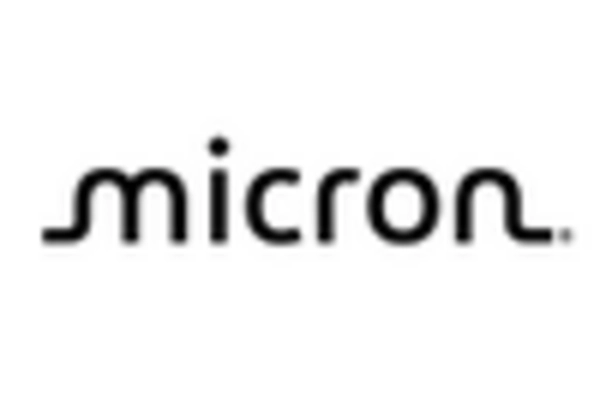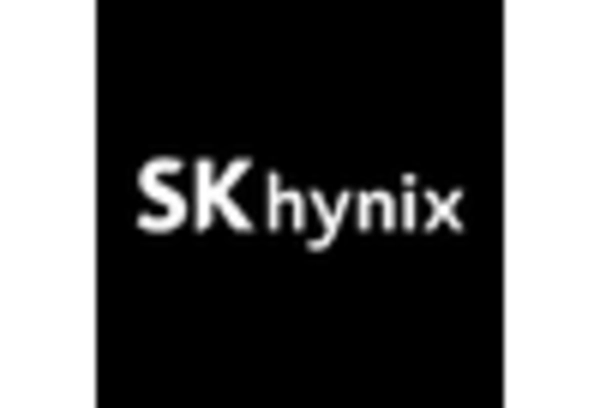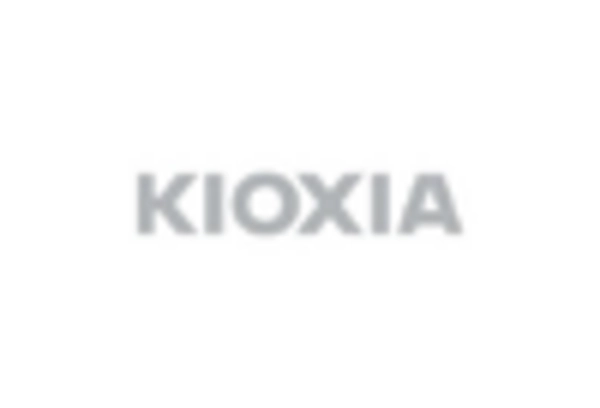Government Initiatives and Support
The Chinese government actively promotes the development of advanced technologies, including those related to the ssd controller market. Initiatives aimed at fostering innovation and enhancing the semiconductor industry are likely to create a favorable environment for market growth. For instance, the government has allocated substantial funding to support research and development in semiconductor technologies, which includes SSD controllers. This support may lead to increased collaboration between public and private sectors, resulting in enhanced technological advancements. Furthermore, policies encouraging local manufacturing of electronic components could reduce dependency on foreign imports, thereby strengthening the domestic ssd controller market. As a result, the market may witness a surge in local production capabilities and technological expertise.
Rising Demand for Data Storage Solutions
The increasing volume of data generated across various sectors in China drives the demand for efficient data storage solutions. As businesses and consumers alike seek to manage vast amounts of information, the SSD controller market is experiencing significant growth. In 2025, the data storage market in China is projected to reach approximately $20 billion, with SSDs accounting for a substantial share. This trend indicates a robust need for advanced SSD controllers that can enhance performance and reliability. The proliferation of cloud computing and big data analytics further fuels this demand, as organizations require high-speed data access and storage capabilities. Consequently, manufacturers in the ssd controller market are likely to innovate and develop more sophisticated controllers to meet these evolving needs.
Technological Integration in Smart Devices
The integration of advanced technologies in smart devices is reshaping the landscape of the ssd controller market. As China continues to embrace the Internet of Things (IoT) and smart home technologies, the demand for efficient storage solutions becomes paramount. Smart devices require SSDs with high-performance controllers to manage data effectively and ensure seamless operation. The market for smart home devices is projected to grow at a CAGR of over 20% in the coming years, indicating a substantial opportunity for the ssd controller market. Manufacturers may need to innovate and adapt their products to meet the specific requirements of smart devices, such as low power consumption and high-speed data transfer. This trend highlights the potential for growth within the ssd controller market as it aligns with the broader shift towards smart technology.
Increased Focus on Gaming and Entertainment
The gaming and entertainment industry in China is experiencing unprecedented growth, which has a direct impact on the ssd controller market. As gaming becomes more mainstream, the demand for high-performance storage solutions is likely to rise. Gamers require SSDs with advanced controllers to ensure quick load times and smooth gameplay experiences. The gaming market in China is projected to exceed $40 billion in 2025, driving the need for innovative storage solutions. This trend suggests that manufacturers in the ssd controller market may prioritize the development of controllers optimized for gaming applications. Additionally, the rise of cloud gaming services further emphasizes the necessity for high-speed data access, potentially leading to increased investments in the ssd controller market to meet these demands.
Expansion of E-commerce and Digital Services
The rapid expansion of e-commerce and digital services in China significantly impacts the ssd controller market. With the rise of online shopping platforms and digital payment systems, there is a growing need for efficient data processing and storage solutions. In 2025, the e-commerce sector in China is expected to surpass $2 trillion, necessitating robust infrastructure to support this growth. SSDs, powered by advanced controllers, are increasingly favored for their speed and reliability, making them essential for e-commerce platforms. This trend suggests that the ssd controller market will likely benefit from the heightened demand for high-performance storage solutions that can handle large volumes of transactions and data. Consequently, manufacturers may focus on developing specialized controllers tailored for the e-commerce sector.















